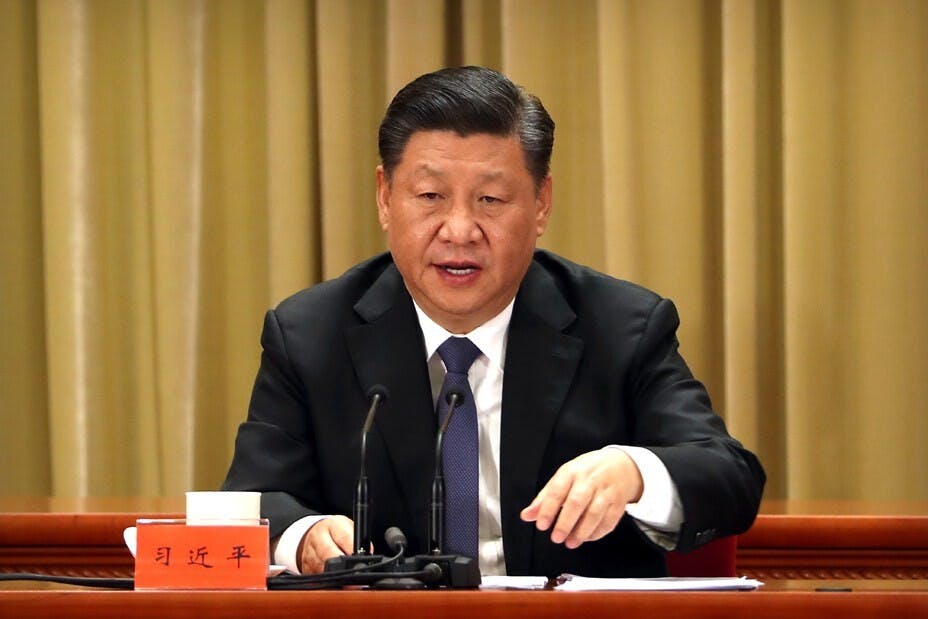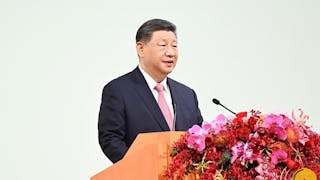中華人民共和國的71周年國慶剛過去幾天。中國政府在治國方面採取了雙管齊下的戰略,即一方面在內部維持保證社會政治穩定和經濟活力的必要權威;另一方面是在外交政策中強調多邊主義。
9月28日,中國共產黨中央政治局召開會議,研究制定國民經濟和社會發展第十四個五年規劃和2035年遠景目標的建議。會議決定根據黨內外徵求意見的情況報告和是次會議討論第十四個五年規劃的意見,修改後將文件稿提請十九屆五中全會審議。總書記習近平主持會議,並直接聽取各界對「十四五」規劃的意見和建議。
8月16日至29日,中共通過互聯網徵詢各界對「十四五」規劃的意見。自上而下和黨內外協商的方式,可以視為中共「民主集中制」的一種做法:領導層和幹部要下到基層,聽取各方面的意見;「集中制」則是從中共保留倡議和修改「十四五」規劃的權力的意義上來說。
據新華社報道,中共中央政治局會議強調了「必須堅持黨的全面領導,堅持和完善中國特色社會主義制度」的重要性。同時,「必須堅持以人民為中心,堅持人民主體地位,維護人民根本利益,增進民生福祉」。會議又強調「必須構建新發展格局,切實轉變發展方式」,以推動質量變革、效率變革和動力變革。
最近,民營經濟的變革已經開始,民企有望與中共在經濟上和政治上的關係更加緊密,並參與振興國有企業並和未來幾年中國戰略產業的發展國;國企和民企進行戰略性合作甚至合併,從而刺激「內循環」的進程,最大限度地減少對外部的依賴並維持內部的供應鏈。
9月30日,國家主席習近平在聯合國生物多樣性峰會上通過視像發表講話,強調中國切實履行氣候變化、生物多樣性等環境相關條約義務,呼籲各國攜手合作,提升全球環境治理水平。習近平的講話表明,中國決心奉行多邊主義,積極參與國際組織,強調面對全球環境風險挑戰,各國是「同舟共濟的人類命運共同體」。
同日晚上,國務院總理李克強在國慶招待會上致辭,強調繼續堅定不移、全面準確貫徹「一國兩制、港人治港、澳人治澳、高度自治」的方針;強調堅持「九二共識」,反對台獨,加強兩岸交流合作,推進兩岸關係和平發展。
習近平和李克強的講話在政治上具有重大意義。在美國總統特朗普領導下的美國,軟實力正在下降,尤其是鑑於美國未能遏制新冠病毒疫情蔓延,中國的發展模式構成對美國全球霸權最嚴重的威脅。這種中國模式強調權威性領導下的內部政治社會穩定和經濟增長,而外交則奉行多邊主義,它為許多發展中國家提供了不一樣的選擇。
China’s two-pronged governing strategy
Judging from the development of the People’s Republic of China (PRC) shortly before the national day on October 1, China is adopting a two-pronged strategy in its governance, namely authoritative in maintaining the necessity of socio-political stability and economic vitality internally on the one hand and of multilateralism in its foreign policy on the other hand.
On September 28, the Politburo of the Chinese Communist Party (CCP) held a meeting to formulate the major objectives of the national economic and social development in the 14thfive-year plan and its vision for 2035. The meeting decided that opinion would be sought from inside and outside the CCP on the draft content of the 14thfive-year plan. President Xi Jinping himself would listen to the views from various sectors of the society directly on their inputs and suggestions regarding the 14thfive-year plan. According to Xinhua news agency, different districts and departments had already confirmed the draft document’s objectives and principles, providing constructive suggestions on how the plan could be improved.
From August 16 to 29, the Party consulted the opinion of the society on the 14thfive-year plan through the Internet. The top-down fashion of consultation with the citizens inside and outside the ruling party can be seen as the practice of Chinese “democratic centralism” in which the leading officials and cadres are expected to go down to the grassroots level to listen to the views of the members of the public, while centralism is retained in the sense that the Party centre retains the power to initiate and revise the 14thfive-year plan.
According to Xinhua, the Politburo meeting also stressed that China’s 13thfive-year plan had already finished the task of propelling the PRC to the stage of achieving xiaokang (a moderately prosperous society). However, in the face of the sudden outbreak of Covid-19, the CCP centre “under the core leadership of comrade Xi Jinping” has to tackle the virus “calmly” and in a united manner so as to lead the nation and nationalities to move forward in the enhancement of China’s economic, technological and comprehensive capabilities.
The meeting emphasized the importance of the CCP’s “comprehensive leadership” and of the “perfection of socialism with Chinese characteristics.” On the one hand, the people must be regarded as the “centre” of governance with their well-being in the minds of the governing leaders. On the other hand, “a new developmental style has to be constructed” to implement quality changes and deepen the process of reforms and opening.
Recently, the reform of the private enterprises has been initiated as they are expected to be brought closer economically and politically under the CCP, with the need to rejuvenate other state-owned enterprises and participate in the development of China’s strategic industries in the coming years.
The PRC Vice-Premier Liu He reportedly on September 27 raised the idea of “mutual progression of both state and private enterprises,” meaning that state-owned and private enterprises should be strategically cooperative and merged, stimulating the process of “internal circulation” in China’s economic growth. Under the circumstances of external sanctions against many Chinese companies, the mainland enterprises, both state-owned and private ones, will have to galvanize their strengths and supplement each other to minimize external dependence and to sustain the internal supply chains.
Some Hong Kong-based reports have mentioned that, due to the hostile external environment, China is going to readjust its growth rate to somewhere between five to six percent. Under the 13thfive-year plan, China’s annual growth rate was adjusted at 6.5 percent from 2016 to 2020, but its economic growth was only 6.1 percent in 2019.
The Politburo also discussed the issuance of new work regulations in the CCP Central Committee members for the sake of “assertively maintaining the central authority and united and core leadership under comrade Xi Jinping,” “retaining and improving socialism with Chinese characteristics,” “promoting national governance system and modernizing national governing capacity,” “comprehensively strengthening the party leadership and construction,” and “resolutely propel the movement of the national revival enterprise,” and “achieving the victory of socialism with Chinese characteristics during the new era.”
The regulations were not published, but clearly it aims at consolidating the discipline, ideological conformity and party leadership of all the Central Committee members, who are occupying key positions in the CCP and the government at central and provincial levels. The Politburo meeting, according to Xinhua, requested that the Politburo members, Standing Committee members, and Central Committee members would have to take the leadership of implementing the CCP constitution, consolidating their consciousness and confidence and adhering to the party line individually and collectively.
On September 30, President Xi Jinping gave a talk in the video conference of the United Nations biological diversity, emphasizing that China takes the “energetic leadership” in he global fight against Covid-19, that a “global consensus on governance” has to be reached through mutual innovation and coordination amid a green economy, that the PRC is working hard to shoulder the international responsibility of dealing with climate change and “creating a green silk road,” and that countries in the world should mutually share, establish and engage in dialogue to solve global issues and problems.
He stressed that “no country has the power to monopolize international affairs and influence the fate of other nations,” and that “no country can isolate itself by adopting exceptionalism and double standards.” President Xi’s remarks showed the PRC’s determination of adopting multilateralism, attaching importance to its participation in international organizations, having dialogue with other countries, and achieving “the construction of a common entity for the mankind’s destiny.” In this aspect, China vowed to increase its funding and humanitarian support for the United Nations in coping with Covid-19, to inject more financial support for south-south development, and to donate US$10,000,000 to the United Nations for women development.
On the morning of September 30, President Xi and other seven members of the Standing Committee of the Politburo went to preside over a ceremony commemorating the “national heroes” on Beijing’s Tiananmen Square. On the same night, Premier Li Keqiang represented the Party centre and the State Council to deliver a speech, emphasizing that the PRC persists in the principles of “one country, two systems,” “Hong Kong people governing Hong Kong,” and “Macau people governing Macau.” Moreover, he added that the 1992 consensus remains the principle of dealing with Taiwan, and that the two sides should enhance cooperation to achieve the objectives of “peaceful development, integrated development and national reunification.”
The remarks made by President Xi and Premier Li remain politically significant. President Xi’s speech at the United Nations on September 30 was a testimony to the PRC’s persistence in its multilateral approach to dealing with countries in the world. At a time when the soft power of the United States under President Donald Trump is in decline, especially in light of the fact that the US fails to contain the spread of Covid-19, the PRC under President Xi Jinping’s leadership has been projecting new values in rivalry to the American global hegemony.
The China model of development is now arguably constituting the most serious menace to the US model. This China model, which is internally authoritative in emphasizing socio-political stability and economic growth under strong leadership and externally multilateral in engaging other countries, is presenting another alternative of development for many other developing countries.
Regarding Beijing-Taipei relations, Li Keqiang’s remarks refer to the continuation of the PRC’s insistence of the bottom line of the 1992 consensus. Yet, so long as the ruling party in Taiwan does not accept it, the relations between Beijing and Taipei remain relatively tense.
In a nutshell, China’s two-pronged strategy of governance can be clearly seen. Domestically, the CCP is continuing to reform the nation with forceful leadership, as the issuance of the new work regulations on the Central Committee members can be seen. The ways in which the Party consults public and societal opinion on the draft 14thfive-year plan show the persistence of “democratic centralism.”
At the same time, the adoption of multilateralism serves the purpose of stimulating the “internal circulation” of the economy in the PRC’s new policy of implementing “double circulations” in which external trade and internal economic development are mutually interactive and beneficial. Under the leadership of the CCP, the foundation of the 14thfive-year plan is firmly established and the realization of the “Chinese renaissance” and “Chinese dream” is expected to enter a new and critical stage of implementation.
原刊於澳門新聞通訊社(MNA)網站,本社獲作者授權轉載。



































